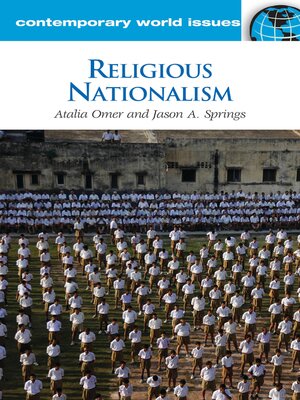
Sign up to save your library
With an OverDrive account, you can save your favorite libraries for at-a-glance information about availability. Find out more about OverDrive accounts.
Find this title in Libby, the library reading app by OverDrive.



Search for a digital library with this title
Title found at these libraries:
| Library Name | Distance |
|---|---|
| Loading... |
This book tackles the assumptions behind common understandings of religious nationalism, exploring the complex connections between religion, nationalism, conflict, and conflict transformation.
Religious Nationalism: A Reference Handbook challenges dominant scholarly works on religious nationalism by identifying the preconceptions that skew analysis of the phenomenon dubbed "religious nationalism." The book utilizes a multidisciplinary approach that draws insight from theories of nationalism, religious studies, peace research, and political theory, and reframes the questions of religious nationalism within the perspectives of secularism, modernity, and Orientalism. In doing so, the author enables readers to uncover their own presumptions regarding the role of religion in public life.
Unlike other works on this subject, the work outlines connections between the analysis of the role of religion in conflict to thoughts regarding how religion may relate to processes of peacebuilding and conflict transformation, and further connects the discussion of religious nationalism to broader conversations on the so-called resurgence of religion. The book will serve advanced high school and college students studying religion, international relations, and related subjects while also appealing to a wide audience of readers with an interest in questions of religion and politics.
Religious Nationalism: A Reference Handbook challenges dominant scholarly works on religious nationalism by identifying the preconceptions that skew analysis of the phenomenon dubbed "religious nationalism." The book utilizes a multidisciplinary approach that draws insight from theories of nationalism, religious studies, peace research, and political theory, and reframes the questions of religious nationalism within the perspectives of secularism, modernity, and Orientalism. In doing so, the author enables readers to uncover their own presumptions regarding the role of religion in public life.
Unlike other works on this subject, the work outlines connections between the analysis of the role of religion in conflict to thoughts regarding how religion may relate to processes of peacebuilding and conflict transformation, and further connects the discussion of religious nationalism to broader conversations on the so-called resurgence of religion. The book will serve advanced high school and college students studying religion, international relations, and related subjects while also appealing to a wide audience of readers with an interest in questions of religion and politics.






